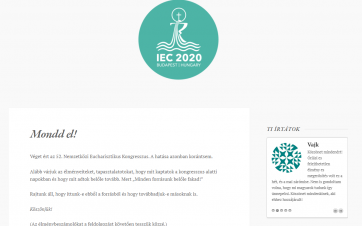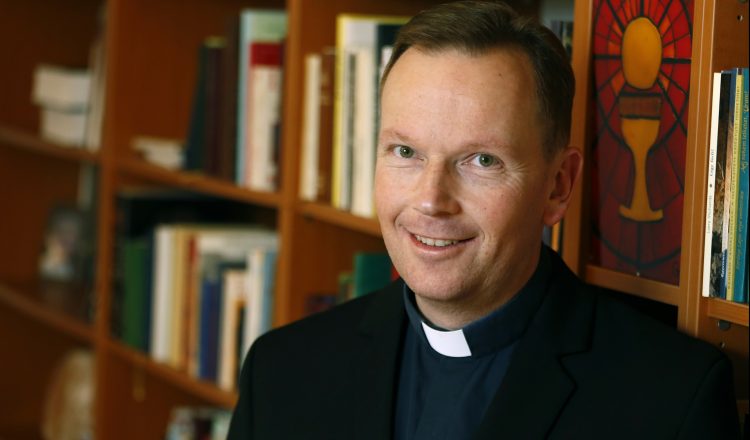
It Is Up to Our Decisions, What the Future of Christianity in Europe Will Be

In 2020 Hungary will host the 52nd International Eucharistic Congress. Such event was organised in Hungary in 1938, with five hundred thousand participants, fifty thousand came from abroad. This is a huge ecclesiastic event, actually it is a one-week-long feast – said Rev. Kornél Fábry, Secretary General of the International Eucharistic Congress in Budapest. “If I mention the Eucharistic Congress, people usually answer in two words: don’t understand. The word “eucharistic” – they say – is some church stuff, and they do not attend congresses. That is why I emphasise the significance of this big celebration, where the participants get a gift of life” – said Kornél Fábry. The last congress was held in the Philippines, where two million people participated. It is likely that in the September of 2020 hundreds of thousands will come to Budapest. Interview with Kornél Fábry.
What does Eucharist actually mean?
The original meaning of the word is thanksgiving. But it also means the Holy Mass and the Eucharist itself. During the last supper – where Jesus gave thanks – the bread turned into his body and the wine into his blood. Jesus is present in each and every mass in the Eucharist. International Eucharistic Congresses are organised every four year on different continents. This is a one week long celebration, where the people can participate in a great number of ecclesiastic programs. The congress in 2020 will be the 52nd.
Pope Francis has announced that the International Eucharistic Congress in 2020 will be hosted by Hungary. What does this mean for the Hungarian Catholic Church?
This in an honour for Hungary. In 1938 we have already hosted a Congress. History is repeating itself, since we also came after the Philippines back then, as well as now. Three years ago, the Congress was in the Philippines. This event is a great opportunity for the spiritual renewal – not only for the Church, but for all people of good will.
All Congresses have a motto. What will be the message of the Hungarian?
The motto is the last line of verse 7 of Psalm 87, which is: “all my springs are in you”. This psalm is about Jerusalem, being the antitype of the heavenly Jerusalem and of the Church. To the Church everyone is invited, regardless their race, gender and age. The Eucharist is both the source and summit of our Christian lives. That is what the Second Vatican Council said. So, this line “all my springs are in you” is true for the Eucharist, too. From the Eucharist – that is from our relationship with Christ – we get strength, joy, peace and life.
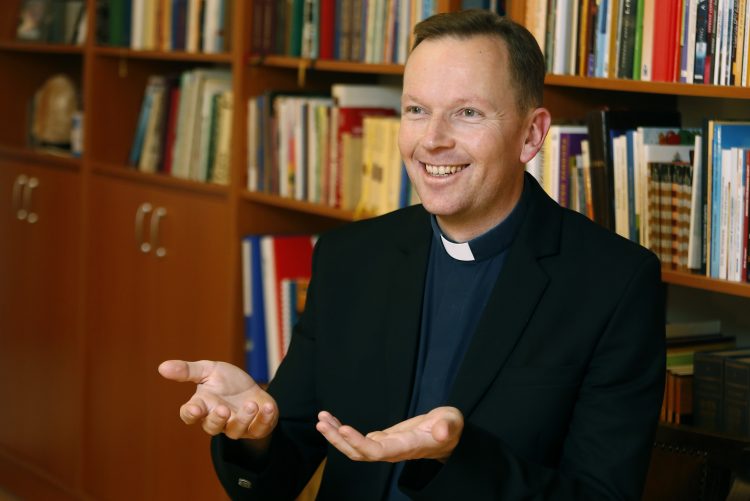
Since it was in 1938 when Hungary last organised such a Congress – obviously it was impossible during the communist regime – many people may not know what to expect. What kind of celebrations will await for the participants?
It is true, that few people understand the expression Eucharist”. I am travelling around the county, and when I say this word, they don’t know that I am talking about. The first thing that comes to one’s mind about congress is that they do not go to such, since lectures are held there one after the other, very clever people are saying clever things. That is not how the Congress in 2020 should be figured.. This will be a big meeting with Jesus in the centre. Between 10-12 September there will be a professional conference, a symposium which is mainly for theologians, though anyone can participate. This will be followed by the opening ceremony and mass in the Puskás Ferenc Stadium on 13th of September, including the first communion. First communion is, when the children first welcome Jesus into their hearts in the Eucharist. To this we already have 2500 applicants. The possibility to apply is still open, so presumably there will be much more. The following morning events of the Congress will be held at the Hungexpo. Everyday will be started with a morning prayer and then lecturers from different continents will give speeches or presentations on various subjects. There will be testimonies and also masses. In the afternoon one can choose from a great variety of programs (mainly cultural). This will be the regular program from Monday to Friday, but there will be special events, too. For example, on Wednesday parishes will host the pilgrims. We will choose ten parishes, and each of them will welcome the bishops and faithful from diverse language territories. One will host the French, the other one the Italian, German, Slovak etc… They will celebrate the mass together, followed by an agape or dinner, maybe by a cultural program. During this week also the Week of Christian Arts will be held, so a great number of programs will be available to choose from. On Thursday afternoon the adoration of the communities will take place on the square in front of St. Stephen’s Basilica. With candle light, songs, testimonies and opportunity for confessions. Friday will be the day of youth – we plan a youth night in the Papp László Sportaréna. On Saturday we call the families for an open-air event. On the very same day a mass will be held on the square in front of the Parliament at 17:00, afterwards a procession with torches will start to the Heroes’ Square. On Sunday, during the closing mass, the torch will be handed over to the delegation of the organising country of the next congress. This will also take place on the Heroes’ Square.
How many people are expected in 2020?
We expect people from many countries. As I have already mentioned, in 1938 there were half million participants, out of which 50 thousand foreign guests. Back then the motto was: “The Eucharist is the bound of love”. Even the last line of the hymn of the International Eucharistic Congress of 1938 resonates to this: “Unite in peace all people and nations”. This was a cry for peace. We very well know the political situation of that time: Hitler was gaining power; the war was just around the corner. Sadly, our cry did not reach the leaders of the world, we could not manage to avoid the war. But this pprayer is still valid even today, to pray in Europe for the peace.
Pilgrim groups will arrive from many countries, and we do hope that many will come from the previous location as well. The geographical situation of Hungary is excellent. being in Central Europe, we are easily approachable. Another important factor is, that our country is safe. We have already introduced the venues in a drone-video, uploaded to the internet in eight languages. In the short film one can see how beautiful our city is, this fact alone worth to pay a visit to Hungary.
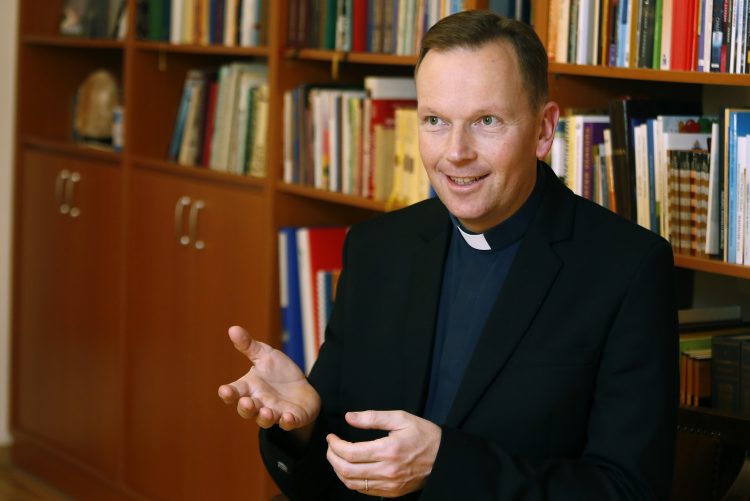
Will Pope Francis be present at the Congress?
His Eminence, Card. Péter Erdő has invited the Holy Father, who has also received an invitation from the deputy prime minister. It is up to him. But amongst the invited guests there are the cardinals from Rio de Janeiro, Quebec, Bombay, New York and Seoul, bishops, priest and laymen are coming from many different countries while among the lecturers we can find Csaba Böjte OFM as well.
Is it the Pope’s choices to select the next congress, and what are the reasonings of such a decision?
Usually the Congress is held every four year, always on a different continent. In 2008 it was in Canada, in 2012 in Dublin, in 2016 in the Philippines, and in 2020 in Hungary. The Holy Father’s decision making is helped by the Pontifical Committee for the International Eucharistic Congresses, led by His Excellency, Archbishop Piero Marini.
You mentioned that it is an honour, that the Pope decided for Hungary. How did the country get this acknowledgement?
To the very same question Card. Péter Erdő answered on Pentecost Monday in 2016: those who ask, will receive. We asked and we received. It is very important for the Church to step over the walls. We have to reach the people with the good news. The Congress is an opportunity for the Church to bear witness of love of God, who became man, who rose from the grave and lives among us in the bread of life, the Eucharist.
You have a special channel to reach the people – mainly the youth. You started a vlog – a video blog – which a “genre” specially for the young.
I did not want to make a vlog. I barely gave the idea to bring the mass closer to the people in the second preparatory year of the Congress. Well, it ended up on me. The message of the Church is still the same, but today we have to transfer the message in a way different from that of the first centuries. Vlog is a communication channel. The short films are spiked with interesting graphics, so they are easy to “consume”, easy to understand. The video series contains 14 parts, and basically it is about the holy mass. A lot of people go to church, but they might not understand everything, what is why. If someone goes through these 14 parts, then they will get to know the parts of the mass.
What kind of feedback did you get from the Church, when they saw the vlog?
I received only positive feedbacks, or helping, bettering critics. The catechists also use it, in many catholic schools they screen a part before the mass. Many parishes have uploaded the videos to their own home pages.
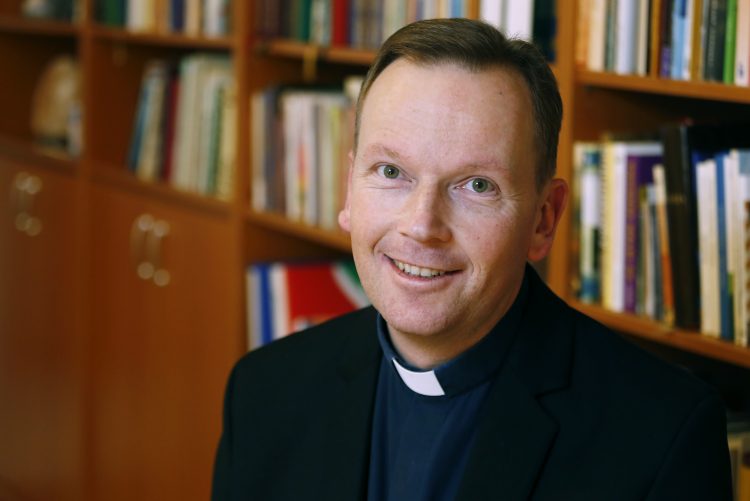
How do you see the situation of the Christians in Europe?
Europe actually has Christian roots. The practice of the religion is a different thing. What I see in Europe is, that every country struggles with different problems. In many cases the Western countries are featured by secularism, by the material well-being, and that God gets left out of the every day life. At the same time there is also a serious – faith practicing – Christian core. For example, France, where I was living for a while, spiritually is like a desert with a few oases. These are the renewed communities, in the centre of which there is the Eucharist. Many have found Jesus, and their life has changed. In the West fewer people practice their Christian faith, but those, who do it, they do it seriously and deeply. In Hungary the great majority of the population is either Catholic or belongs to another Christian denomination. But less of 10 percent of them attends regularly mass or other services. This is partly because of the 40 years of atheist regime, during which those, who practiced their faith, were persecuted. There is a different kind of renewal both in Hungary and in the other ex-communist states. During the many decades of the communist rule, 2-3 generations grew up without receiving any religious education. How would they know about such things? And they also hear a lot of negative information about the Church, since a part of the press tries do destroy everything that has prestige or value. They mention the Church only in negative context. But then some find a personal relationship with the Catholics, Christians, the Church communities and their opinion changes. Many baptise as adult and after that attend church regularly. They find a community of love. Maybe the number of Christians is decreasing in Europe, but worldwide it is definitely increasing. The situation is not hopeless. Our task, as Christians is to make the society better, and also to give hope to people with our faith and lead them to Jesus.
How much is Christianity in danger in Europe?
It was already in danger in the first centuries of the Church. The persecution existed from the very beginning. We also know that only during the 20th century far more Christians were killed, than in the previous centuries altogether. Jesus said: do not be afraid! Whether or not the Christianity is in danger, or does it have a future in Europe, that is up to our decisions. Only one saint can bring a great renewal in a country or continent. If we transfer the faith to the next generation with authentic life and teaching, then there is a future. I am a Catholic Christian, I decided for Jesus. The end might be martyrdom, but I know, I have made a good decision.
Might the result of the Congress in 2020 be the increase of the number of the Christians in Europe, or that the communities become even close?
We trust that the Congress will give a spiritual renewal to the faithful and all who live around us – not only the event itself, but also the three years of preparation, too. Our responsibility is to call out to those, who live around us. The practicing believers also have this responsibility. They are watched, what they say or what they do, how they react in certain situations. For example, I know a girl, who became Catholic as an adult, because she saw, how a Christian university classmate of hers dealt with the death of her mother. This gave her such a strength, that she said: I also need this treasure. Yes, we have a treasure, which should be shared with others. I trust that we do not organise only one event, but that it will be fruitful in the long run as well.
The main message of the International Eucharistic Congress towards everyone is: love.
Photo: Marcsi Ambrus
Source: origo.hu




